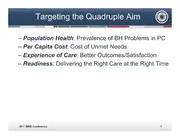
DTIC ADA556246: Behavioral Health in the Patient Centered Medical Home (PCMH): An Important Part of Meeting the Quadruple Aim and Achieving Level II & III NCQA PCMH Recognition PDF
Preview DTIC ADA556246: Behavioral Health in the Patient Centered Medical Home (PCMH): An Important Part of Meeting the Quadruple Aim and Achieving Level II & III NCQA PCMH Recognition
22001110 MMiilliittaarryy HHeeaalltthh SSyysstteemm CCoonnffeerreennccee Behavioral Health in the Patient Centered Medical Home (PCMH) An Important Part of Meeting the Quadruple Aim and Achieving Level II & III NCQA PCMH Recognition SThhea rQinuga Kdnruopwlele Adgime:: WAcohrkieinvgin Tgo Bgreethaektrh, rAocuhgiehv Pinegr fSorumccaenscse LCDR Christopher L. Hunter, Ph.D., ABPP 24 January 2011 TRICARE Management Activity Report Documentation Page Form Approved OMB No. 0704-0188 Public reporting burden for the collection of information is estimated to average 1 hour per response, including the time for reviewing instructions, searching existing data sources, gathering and maintaining the data needed, and completing and reviewing the collection of information. Send comments regarding this burden estimate or any other aspect of this collection of information, including suggestions for reducing this burden, to Washington Headquarters Services, Directorate for Information Operations and Reports, 1215 Jefferson Davis Highway, Suite 1204, Arlington VA 22202-4302. Respondents should be aware that notwithstanding any other provision of law, no person shall be subject to a penalty for failing to comply with a collection of information if it does not display a currently valid OMB control number. 1. REPORT DATE 3. DATES COVERED 24 JAN 2011 2. REPORT TYPE 00-00-2011 to 00-00-2011 4. TITLE AND SUBTITLE 5a. CONTRACT NUMBER Behavioral Health in the Patient Centered Medical Home (PCMH): An 5b. GRANT NUMBER Important Part of Meeting the Quadruple Aim and Achieving Level II & III NCQA PCMH Recognition 5c. PROGRAM ELEMENT NUMBER 6. AUTHOR(S) 5d. PROJECT NUMBER 5e. TASK NUMBER 5f. WORK UNIT NUMBER 7. PERFORMING ORGANIZATION NAME(S) AND ADDRESS(ES) 8. PERFORMING ORGANIZATION Military Health System,TRICARE Management Activity,5111 Leesburg REPORT NUMBER Pike, Skyline 5,Falls Church,VA,22041 9. SPONSORING/MONITORING AGENCY NAME(S) AND ADDRESS(ES) 10. SPONSOR/MONITOR’S ACRONYM(S) 11. SPONSOR/MONITOR’S REPORT NUMBER(S) 12. DISTRIBUTION/AVAILABILITY STATEMENT Approved for public release; distribution unlimited 13. SUPPLEMENTARY NOTES presented at the 2011 Military Health System Conference, January 24-27, National Harbor, Maryland 14. ABSTRACT 15. SUBJECT TERMS 16. SECURITY CLASSIFICATION OF: 17. LIMITATION OF 18. NUMBER 19a. NAME OF ABSTRACT OF PAGES RESPONSIBLE PERSON a. REPORT b. ABSTRACT c. THIS PAGE Same as 22 unclassified unclassified unclassified Report (SAR) Standard Form 298 (Rev. 8-98) Prescribed by ANSI Std Z39-18 Behavioral Health in the PCMH Overview – Models of Care – Targeting the Quadruple Aim – Turning the MHS Strategic Imperative Dials – NCQA Level 2 & 3 Recognition – Funding & Current Status – The Way Ahead 2011 MHS Conference 2 Models of Care – Care Management Model Typically focused on a discrete clinical problem • Specific pathways to systematically address how BH problems are managed in PCMH • PC providers & care managers share information • Systematic interface with the outpatient mental health clinic 2011 MHS Conference 3 Models of Care – Primary Care Behavioral Health Model Focused on all enrolled patients • Embedded with PC team • BHPs & PCMs share patient information • Brings a team-based management approach • Helps team improve BH assessment & intervention • Sees patients in 15-30 minute appointments • Same day as well as scheduled appointment availability • Focuses on full range of BH & health behavior change 2011 MHS Conference 4 Models of Care – Blended Model Focused on all enrolled patients • Care Manager and Embedded BHP – Continuity of Care – Stepped Care – Access to all enrollees to BHP in the PCMH – Clinical Feasibility and Efficiency – Implements DoD/VA guidelines 2011 MHS Conference 5 Targeting the Quadruple Aim – Population Health: Prevalence of BH Problems in PC – Per Capita Cost: Cost of Unmet Needs – Experience of Care: Better Outcomes/Satisfaction – Readiness: Delivering the Right Care at the Right Time 2011 MHS Conference 6 Population Health: Prevalence – 80% with BH disorder visit PC at least once a year1 – 50% of all BH disorders are treated in PC2 – 48% of the appointments for all psychotropic agents are with a non-psychiatric PC provider3 1. Narrow et al., Arch Gen Psychiatry. 1993;50:5-107. 2. Kessler et al., NEJM. 2006;353:2515-23. 3. Pincus et al., JAMA. 1998;279:526-531. 2011 MHS Conference 7 Population Health: Unmet BH Need – 67% with a BH disorder do not get BH treatment1 – 30-50% of referrals from PC to outpatient BH clinic don’t make 1st appt2,3 – 50% of PCMs, can only sometimes, rarely or never get high-quality behavioral health referrals for patients4 1. Kessler et al., NEJM. 2005;352:515-23. 2. Fisher & Ransom, Arch Intern Med. 1997;6:324-333. 3. Hoge et al., JAMA. 2006;95:1023-1032. 4. Trude & Stoddard, J Gen Intern Med. 2003;18:442-449. 2011 MHS Conference 8 Population Health: Unmet BH Need – 20% of deployed Service members screen positive for symptoms indicative of a BH condition1 – 78% report a need for help, but less than 1/4 receive it1 – Health Care Survey of DoD Beneficiaries (2008): ~40% of MHS beneficiaries report difficulties accessing BH care ~70% of family members report challenges accessing urgent BH care 1. Hoge et al, NEJM. 2004; 351:13-22 2011 MHS Conference 9
